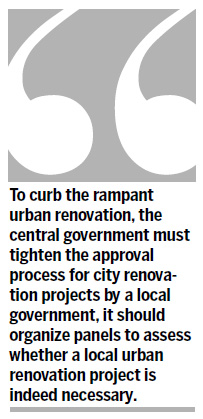Zhu Yuan
Building for people not profit
By Zhu Yuan (China Daily)
Updated: 2010-11-24 07:56
 |
Large Medium Small |

Improving urban planning and enhancing supervision of the construction industry are desperately needed
Statistics show that complaints about the quality of housing increased from 37.1 percent in 2008 to 52.5 percent in 2009.
The repeated reports about serious quality problems with some newly built residential buildings reinforce concerns that the nation's housing is of poor quality.
Qiu Baoxing, vice-minister of housing and urban-rural development, has said on several occasions that the life span of most Chinese houses is around 30 years.
However, a cluster of buildings intended for low-income residents in suburban Beijing had to be demolished even before they were finished, because substandard concrete was used in their construction. This is not an isolated incident.
Unfortunately, our urban planners nowadays seem to give little thought to their construction projects. They are too obsessed with the economic growth that construction projects bring to care about the quality of their buildings.
For corrupt officials, the shorter a building's life span the more opportunities there are for profit. The majority of corrupt officials caught in recent years have been found to be involved in dirty deals with developers. Little wonder they love construction projects, huge investment projects in particular.
And, so long as they can keep building houses local governments will be happy, as both construction and demolition add to the GDP.
At least 10 percent of the country's economic growth is supported by the consumption of construction materials. The amount of cement that China consumes annually is nearly 50 percent of the world total and the amount of steel consumed accounts for nearly 40 percent of the world total.
Halting the vicious cycle of tearing down short-lived buildings and erecting new ones of poor quality is one of the major challenges to transforming the development mode, which the central government and Party leadership identified as one of the major targets of the 12th Five-Year Plan (2011-2015).
As a country with per capita natural resources much lower than the world average, China cannot afford to squander its resources on substandard housing just to turn a quick profit for officials and developers. The growth obtained by such construction will sap the nation's strength in the long run.
The demolition of buildings that can be used for many years is extremely wasteful. Rubble from demolished buildings and refurbishment is 400 million tons a year, accounting for 30 to 40 percent of urban waste.
When the Five-Lake Hotel in Nanchang, capital of East China's Jiangxi province, was torn down in February 2010, it produced 40,000 tons of rubble. It was only 13 years old and had been honored as one of the country's best buildings two years after it was constructed.
The wastefulness of tearing down perfectly good buildings is compounded by the substandard quality of the buildings that replace them. Buildings, which have been finished in recent years, are supposed to have a life span of at least 50 years, but it is extremely doubtful that any will last that long.
An old Chinese saying goes: "A construction project should never be started without enough consideration and preparation in advance."
To curb the rampant urban renovation, the central government must tighten the approval process for city renovation projects by a local government, it should organize panels to assess whether a local urban renovation project is indeed necessary.
In addition, local urban residents should be allowed to express their own opinions on an urban construction project, which after all will be constructed with their money and have a bearing on their future lives. Their opinions should be canvassed and then the local people's congress should vote on the project.
The decision-making process for urban renovation projects should also be transparent to let taxpayers know why their money is being spent on a particular project and how the money is to be used.
At the same time, supervision must be tightened over the construction of commercial buildings to ensure quality. Those developers who use poor quality construction materials to maximize their profits should never be allowed to gain from the low quality housing they provide.
Transforming the development model will not be realized overnight. Much needs to be done to improve the present mechanisms and establish new ones.
If measures cannot be established to cut the cozy collusion between developers and officials, and local governments still have the absolute say over construction projects in years to come, there will hardly be any hope of checking the rampant profiteering from unnecessary urban renovations.
In this sense, whether this sector can realize healthy development in the coming five years will, to some extent, reflect how much this government has achieved in transforming the country's development model.
The author is a senior writer of China Daily.
(China Daily 11/24/2010 page8)